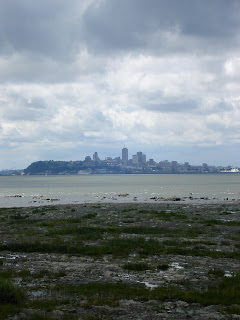Twenty-Second Sunday in Ordinary Time [A]
Well…how do you like the weather?
It’s kind of interesting to consider just how spectacular yesterday was:
sunshine, blue skies, fluffy clouds, the temperature just right—
all you could hope for at the end of August.
all you could hope for at the end of August.
And now: this.
Such a dramatic change…and so very suddenly.
We see the same sort of thing in our gospel readings.
Jog your memories, if you will…
…all the way back to last week.
Jesus was asking his disciples,
“Who do the crowds—who do you—say that I am?”
Simon answers, “You are the Christ, the Son of God!”
And Jesus responds, “You are Peter,
and upon this rock I will build my church.”
In the original Greek text of that passage,
“Peter” is Petros, and “rock” is petra.
Hear the connection that gets lost in translation?
If we were to have the same play on words in English as Greek,
we’d probably call the Pope the successor to “Saint Rocky!”
Now…back to this Sunday.
We’re still in the very same chapter of Matthew.
Jesus, for the first time, predicts to his disciples
that he must go up to Jerusalem and there be killed.
Peter wants to hear nothing of it: “God forbid!”
And Jesus’ response?
“Get behind me, Satan! You are an obstacle to me.”
In the Greek, the “obstacle” is skandalon—
which gives us our English word, “scandal”—
literally, a “stumbling-block.”
In pretty short order,
Jesus goes from naming Simon, “Rocky,”
to calling him, “Blockhead.”
How did Peter fall so hard and so fast?
Where is his mistake?
When Peter got things right last Sunday,
when the sun was shining down so bright upon him,
Jesus said to him, “Flesh and blood did not reveal this to you.
You didn’t figure it out on your own
or with the help of other men.
No—this was made known to you by my heavenly Father.”
And now, when Peter’s way off base,
when the dark, heavy clouds are rolling in,
Jesus says, “You are thinking not as God does, but as human beings do.”
You see, Peter isn’t called “the rock”
because of his personal accomplishments or private virtue.
In fact, judged solely on his natural character,
Peter is anything but a rock.
He’s the one who—for lack of faith—
sinks through the stormy waves.
He’s the one who—out of fear—
denies even knowing his Master three times. (cf. J. Ratzinger)
It’s only because of God and God’s grace,
because the Lord chooses and commissions him,
that Peter will go on to preach boldly in foreign lands,
to be a vital point of unity in the infant Church,
and to bravely give his life on a Roman cross.
So, which is Simon Peter?
Petra or skandalon? Rock or stumbling-block?
He’s both…and so are we.
Somehow, most of us have subscribed to the notion
that to be a good disciple, to be a good Christian,
we have to get it all right, to keep it all together.
There we’re wrong on two accounts:
first, that we can be perfect;
and then, that it depends on us.
And that, my friends, would seem to be why
Jesus insists that I must deny myself—
that I must lose my life in order to find it.
I must let go of the foolish pride which says,
“I know best! I can do it myself!”
The simple fact of the matter is,
my human nature is feeble and frail…
…while God’s grace is strong.
By myself, I trip over obstacles—
maybe even prove to be a scandal,
a stumbling block to others.
But with the Lord,
his strength shines through my weakness,
and only thus is the Church built up,
one living stone set upon another.
Last Thursday evening,
as I was coming back from a brief visit to my family in Plattsburgh,
I drove through a short rain shower just before sunset.
As the waning daylight broke through the clouds,
a most brilliant rainbow appeared across the sky.
But such a spectacular sight can only be seen
when the sun shines through the storm.
It takes both!
Likewise, God’s almighty power is best revealed
not when I run away from life’s heavy crosses,
nor when I try to avoid life’s threatening storms,
but when I let the Lord break right through them—
when I let him shine through my weak humanity.
So…when you’re feeling like a blockhead, don’t lose hope!
Not only are you in good company,
but at least it means that you’re still pretty rocky.
Allow the Lord’s strong hand to set you firmly on his foundation,
and you’ll never be an obstacle standing in his way.




















































